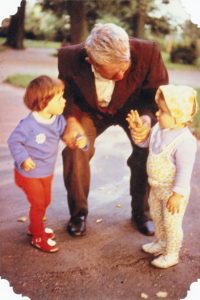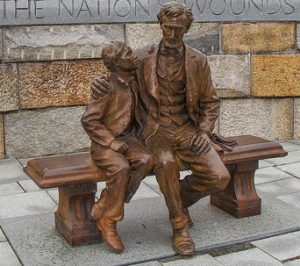Kids need elderly friends and intergenerational relationships. Presidents Day has inspired this post; they are not elderly but older than young parents.

More and more, we are seeing the importance of social skills and the impact they have on learning and life. With young kids, we think of helping them make friends with children their own age. Kids also need friends of other ages, younger than they are and especially older.
Children with grandparents have contact with older adults right in their family. That is, if the grandparents don’t live too far away. Sometimes, there are aunts and uncles of the parents included in the family circle too. For many children, though, this intergenerational contact is limited.
Why are intergenerational relationships so beneficial? The Legacy Project has a super article called “Benefits of Intergenerational Connections.” This is a brief summary of Susan Bosak’s key points:
Parents are very busy doing in order to support the family. Older adults, like kids, have a different pace to life and more focused on being. They give a sense of continuity and perspective, of the circle of life, helping kids develop their skills and self-esteem. The tasks kids can do that older adults can’t serve to give kids a feeling of being truly needed.
The impact of these relationships shows up in some astonishing research, “One study showed that when a child is mentored by an adult, they are: 46% less likely to begin using illegal drugs; 27% less likely to begin using alcohol; 52% less likely to skip school.” Although these statistics don’t apply to young kids now, they are part of children’s future. When it comes to the future, “Knowledge, skills, and attitudes children pick up from elders tend to stick with them through life more than those picked up from other sources.” And children have the whole of their lives before them.

For these and many other reasons, kids need elderly friends and intergenerational relationships. For that matter, we need them too. Presidents Day highlights the achievements and contributions of older adults for the ‘family’ of a country. No matter what country is home for you and your family, can your child’s day include some contact and play time with an older friend?
